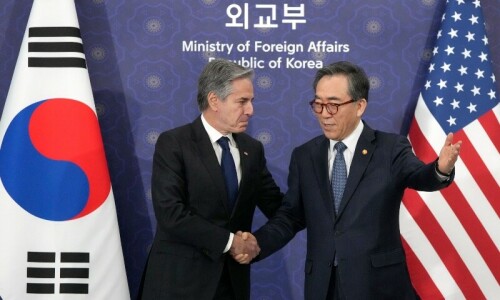RIYADH: Khaled never thought a form of temporary marriage would open the door to his happily-ever-after. The 25-year-old Saudi security guard opted to marry Zeinab, also a Saudi, through a Misyar contract — a kind of marriage under which couples often live separately but get together regularly.
Khaled and Zeinab are among thousands of people who choose Misyar in this ultraconservative kingdom where contact between unrelated men and women is forbidden and extramarital affair regarded as a grave sin.
Misyar is allowed in Sunni Islam and it is legal in Saudi Arabia, the birthplace of Islam and other Middle East countries. But it is traditionally frowned upon and the fact that it leaves the wife financially vulnerable has angered many women’s activists and intellectuals.
After years of study, the influential Makkah-based Islamic Jurisprudence Assembly in April this year declared that Misyar marriage was legal, angering many women’s rights’ activists in the Gulf.
Influential Muslim cleric Youssef al-Qaradawi has given his blessing to Misyar, but said there should be at least some form of dowry to provide a guarantee for the wife.
“No doubt it is somehow socially unacceptable, but there is a big difference between what is Islamically valid and what is socially acceptable,” he recently told Al Jazeera television.
Misyar offers an alternative to cash-strapped men who want to avoid lavish weddings but would like a relationship, without incurring the wrath of the morality police.
Under Misyar, the husband is not financially responsible for his wife.
Khaled, who declined to give his full name, admitted he wasn’t serious about commitment when he decided on Misyar.
But now, he and Zeinab are expecting a baby together.
“I thought let’s give it a try ... and now I feel like a hero in a romantic film,” he said.
“Misyar reduces marriage to sexual intercourse,” said Hatoun al-Fassi, a female Saudi historian. “For clerics to allow it is shameful for our religion.”
In regular marriages in Saudi Arabia, men must pay for expensive ceremonies, huge dowries and a home. If the couple divorce, he must pay alimony and child support.
So Misyar appeals to men of reduced means, as well as men looking for a flexible arrangement — the husband can walk away from a Misyar and can marry other women without informing his first wife.
Wealthy Muslims sometimes contract Misyar when on holiday to allow them to have company of a woman without breaching the tenets of their faith.
This vulnerability has sometimes encouraged abuses: women sometimes act as matchmakers for less than scrupulous men on the prowl for lonely and wealthy spinsters.
Saudi television presenter Rima al-Shamikh said Misyar is the result of frustration among Saudi Arabia’s largely youthful population, bound by a strict religious code but exposed to western lifestyles through the media and Internet.
“Our young people watch the satellite television channels. There is dissatisfaction,” she explained.
“Misyar is a way of getting around the obstacles of marriage in Gulf societies.”
Some scholars say Misyar was practised in the Arabian peninsula during the early days of Islam, when men were often away for months during battles or for trading.
The practice reappeared in the early 19th century in Egypt, where it is known as Urfi marriage and is now very common.
Saudi clerics say Misyar is authorised as long as it meets the basic requirements of sharia, — consent of both parties, the blessing of the woman’s guardian, the presence of witnesses and a state marriage official.
Advertisements for Saudi men and women seeking Misyar marriage abound on the Internet, recalling the “lonely hearts” columns popular in Western newspapers.
“I am a 33-year-old Saudi man with acceptable looks seeking to marry a Saudi virgin or a divorcee,” read one posting on a special Misyar website. “Saudi man seeking divorcee living in Jeddah, no objection to children,” read another.
But not all Misyar couples are in it for the short-term. A few, like Khaled and Zeinab, find Misyar can be a first step to something more durable.
“We got used to each other very quickly,” said Khaled, who has been married for 18 months. “Then she got pregnant. We couldn’t bear our situation, so we decided to live together for real, not just with Misyar.”—Reuters








































Dear visitor, the comments section is undergoing an overhaul and will return soon.